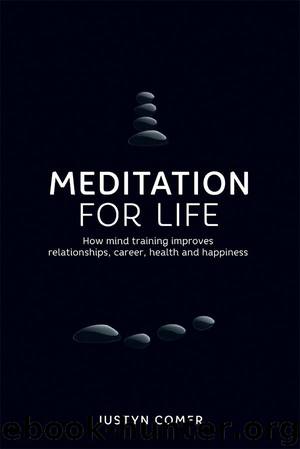Meditation for Life by Justyn Comer

Author:Justyn Comer
Language: eng
Format: epub
ISBN: 9781784523268
Publisher: Panoma Press Ltd
Stress
A major motivation for writing this book was in reaction to the widely-held belief that meditation is for stress relief. Meditation is about so much more than stress relief. Stress relief is just a nice, ancillary benefit of meditation but it is certainly not its main purpose. Nevertheless, I recognize that stress reduction is a major reason people come to meditation. Many people are over-stressed, and chronic stress is exceptionally bad for you. Meditation works in alleviating stress and helping us manage stressful situations better. So let’s look at stress in more detail and see what’s going on when you meditate.
Stress is a complex topic. Scientists don’t tend to use the word stress because it doesn’t mean to them what it means to us. What we think of as stress, they see as merely one end of a continuum of physiological arousal. At one end of the scale, scientists see complete relaxation, with a slower pulse rate, calmer brain activity, and a negligible presence of adrenaline or related hormones. Then there is some ‘arousal,’ which could appear as anticipation, energy, or excitement. Try to remember that feeling you got as a kid before your birthday. There were elevated levels of hope and expectation. Not what we’d think of as stress, but from a scientist’s point of view this is part of the continuum of ‘arousal.’ Then there comes a tipping point between peak excitement and what we think of as stress.
The theory is that there is a state where we are fine, living in a state of concentration and focus, which does have elevated heart rate, heightened brain activity, and slightly elevated hormone levels. Going over the edge is when we very suddenly feel we are no longer capable of managing what’s in front of us. The ‘challenge’ that we were okay dealing with has turned into a ‘threat’ which we don’t believe we can handle, or we sense that the perceived danger is overwhelming. Scientists refer to the state where we’re okay as ‘eustress,’ and the state where we aren’t as ‘distress.’
Human bodies are the result of millions of years of evolutionary adaptation that have allowed us to survive. The physiological response to distress is the same as if we were being chased by a lion. The body reacts with a release of adrenaline related hormones and a diversion of blood away from the brain and stomach towards our muscles. This leaves us feeling queasy, lightheaded, and not able to think as clearly. Under threat, our mental capacities are compromised in favor of sending blood and energy to our muscles.
These responses to distress are useful and appropriate when our physical survival is threatened. They aren’t helpful when we are facing modern, everyday threats whether they are to our career, relationships, reputation, finances, or whatever. When feeling overwhelmed by the demands of the job, of family life, or keeping up to date with news, social media, and changes in society, our body responds by flooding us with powerful chemicals and sending blood to our muscles.
Download
This site does not store any files on its server. We only index and link to content provided by other sites. Please contact the content providers to delete copyright contents if any and email us, we'll remove relevant links or contents immediately.
| Acupuncture & Acupressure | Aromatherapy |
| Ayurveda | Chelation |
| Chinese Medicine | Energy Healing |
| Healing | Herbal Remedies |
| Holistic | Homeopathy |
| Hypnotherapy | Massage |
| Meditation | Naturopathy |
| Reference |
Inner Engineering: A Yogi's Guide to Joy by Sadhguru(6796)
The Power of Now: A Guide to Spiritual Enlightenment by Eckhart Tolle(5782)
Fear by Osho(4740)
Ikigai by Héctor García & Francesc Miralles(4274)
The Art of Happiness by The Dalai Lama(4130)
The Ultimate Bodybuilding Cookbook by Kendall Lou Schmidt(3945)
Yoga Therapy by Mark Stephens(3749)
The Little Book of Hygge by Meik Wiking(3694)
The Healing Self by Deepak Chopra(3580)
Why Buddhism is True by Robert Wright(3454)
The Hatha Yoga Pradipika (Translated) by Svatmarama(3342)
Being Aware of Being Aware by Rupert Spira(3276)
Shift into Freedom by Loch Kelly(3199)
Wild Words from Wild Women by Stephens Autumn(3153)
Work Clean by Dan Charnas(3123)
Happiness by Matthieu Ricard(3050)
More Language of Letting Go: 366 New Daily Meditations by Melody Beattie(3030)
Yoga Body & Mind Handbook by Jasmine Tarkeshi(2880)
Why I Am Not a Feminist by Jessa Crispin(2760)
